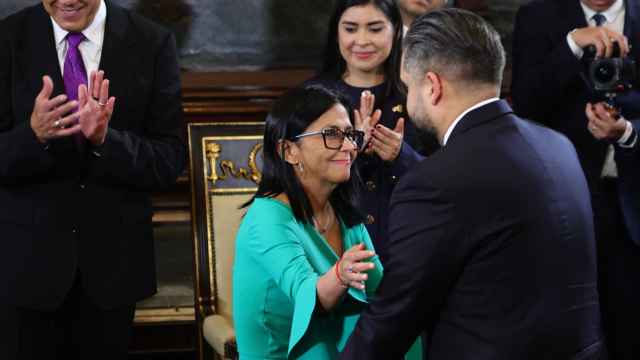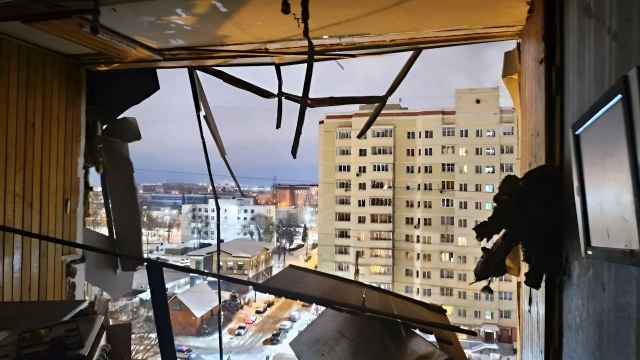The smell of February is lingering in the air — February 1917, that is.
I am not talking about the revolutions in the Middle East but about Russia’s extraordinarily weak leaders and the growing contempt that the leading public figures and ordinary citizens are showing toward them.
Look how quickly the seemingly ironclad vertical power structure can evaporate into thin air. For example, Bolshoi prima-turned-celebrity Anastasia Volochkova had no qualms about publicly thumbing her nose at United Russia when she quit the party after revealing that she was “tricked” into signing a group letter in support of prosecuting former Yukos CEO Mikhail Khodorkovsky. In the 1970s, no Soviet citizen would have even thought about snubbing the Communist Party.
Then there was Natalya Vasilyeva, spokeswoman to Judge Viktor Danilkin in the second criminal case against Khodorkovsky, who revealed that the verdict was written by the Moscow City Court and forced on Danilkin. Certainly Vasilyeva would have never dared such a move if she thought that her life were at risk.
Meanwhile, Russian authorities are worried about their loss of control over citizens who blatantly display insolence and contempt toward the current regime. Pressed to the wall, the only thing President Dmitry Medvedev could say to deflect attention from these embarrassing weaknesses was his Putin-like bluster in Vladikavkaz last week, when he implied that foreign powers are conspiring (again) to disintegrate Russia.
Let’s not forget Russia’s courts. Billionaire Gennady Timchenko filed a libel lawsuit against opposition figure Boris Nemtsov, and Nemtsov turned around and filed a slander case against Prime Minister Vladimir Putin.
Timchenko sued Nemtsov for writing that Putin’s old friends — himself, Yury Kovalchuk and the Rotenberg brothers — were “nobodies” before Putin came to power but quickly became billionaires during his reign.
Nemtsov responded to the charges by presenting documents to the court showing that, before Putin came to power, Timchenko had a yearly income of 326,000 euros ($450,000) in 1999, while Forbes estimated his fortune at $1.9 billion in 2010. Nemtsov also presented a document showing that Timchenko had flown gymnast Alina Kabayeva along with Putin’s friend Nikolai Shamalov, the nominal owner of Putin’s $1 billion Black Sea palace, in his private jet.
Nemtsov filed a lawsuit against Putin for stating during his annual televised call-in show that Nemtsov and others had embezzled billions of dollars along with tycoon Boris Berezovsky in the 1990s.
The only thing Putin’s lawyers could present as evidence in court was a Wikipedia article about Berezovsky that made no mention of Nemtsov but did state that Berezovsky financed and organized Putin’s presidential election campaign in 2000.
The notion that Putin is a leader who instills fear and discipline among bureaucrats and citizens is a myth. One WikiLeaks diplomatic cable revealing that most of Putin’s decrees went unfulfilled is enough evidence in and of itself.
With Putin looking more like Tsar Nicholas II, the smell of February 1917 is clearly in the air. It is the smell of a confused, wounded and weakened leader and a bureaucratic class standing dazed before the public eye. It is the smell of blood in the water.
It is not an especially pleasant odor because as experience has shown in impoverished countries led by corrupt and incompetent rulers, this kind of February 1917 can easily bring about another October 1917.
Yulia Latynina hosts a political talk show on Ekho Moskvy radio.
A Message from The Moscow Times:
Dear readers,
We are facing unprecedented challenges. Russia's Prosecutor General's Office has designated The Moscow Times as an "undesirable" organization, criminalizing our work and putting our staff at risk of prosecution. This follows our earlier unjust labeling as a "foreign agent."
These actions are direct attempts to silence independent journalism in Russia. The authorities claim our work "discredits the decisions of the Russian leadership." We see things differently: we strive to provide accurate, unbiased reporting on Russia.
We, the journalists of The Moscow Times, refuse to be silenced. But to continue our work, we need your help.
Your support, no matter how small, makes a world of difference. If you can, please support us monthly starting from just $2. It's quick to set up, and every contribution makes a significant impact.
By supporting The Moscow Times, you're defending open, independent journalism in the face of repression. Thank you for standing with us.
Remind me later.





